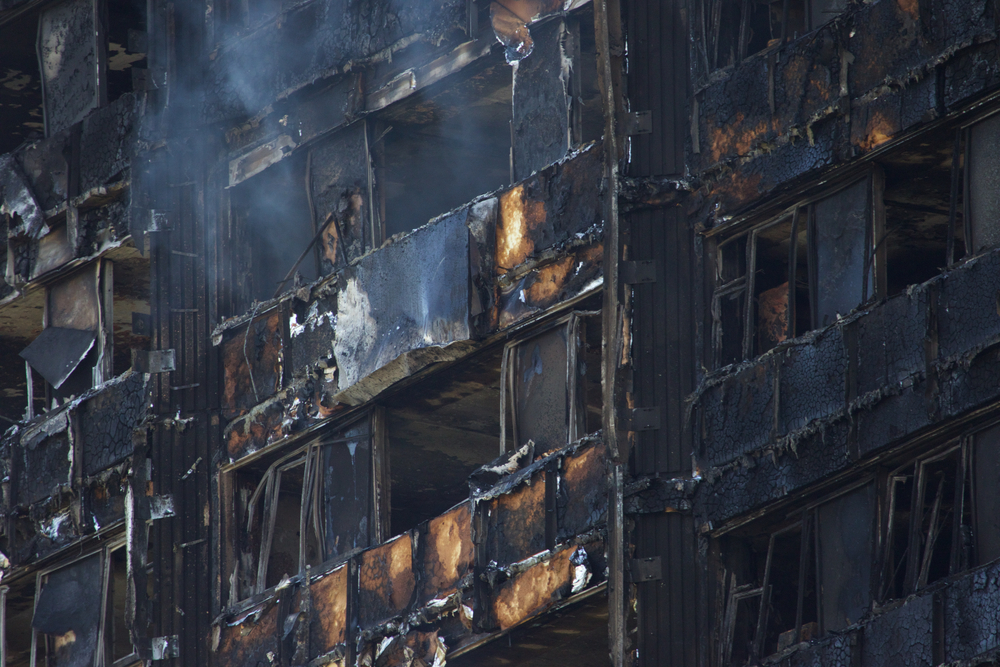NFCC respond to Grenfell recommendations
- November 3, 2020
- 10:36 am


Iain Hoey
Share this content
The National Fire Chiefs Council have released the following statement in response to recommendations made in the Grenfell inquiry.
NFCC statement in full
The Grenfell Tower fire was an appalling tragedy that has sent shock waves throughout this country and the rest of the world. Nowhere more so than in fire and rescue services across the UK.
The National Fire Chiefs Council (NFCC) is working with every Fire and Rescue Services (FRS) in the UK to drive changes that will stop such an event from ever happening again.
On the first anniversary (October 30th) of the publication of Sir Martin Moore-Bick’s Grenfell Tower Inquiry (GTI) report all FRS continue to react to the 46 recommendations – making changes to the way that firefighters would respond in similar circumstances.
The NFCC Chair, Roy Wilsher said: “It is more than three years since the fire and the thoughts of all in fire and rescue services across the UK remain with families still coming to terms with the appalling and unnecessary loss of their loved ones. Our hearts go out to them.”
The NFCC is dedicated to identifying the root causes of the fire and making sure that the right things are done to address them. Therefore, the overriding priority for NFCC is to make sure there is change in the way that buildings – including high-rise homes – are constructed, refurbished and managed.
Mr Wilsher added: “High-rise residential buildings need to have safety features that protect both the residents and firefighters from a fire. If those features are not present, or fail, the public and the firefighters who serve them will find themselves in a hugely challenging and very dangerous situation. We are seeing clear evidence of a failure in the building system that should make sure that buildings are safe – sadly, the Grenfell Tower fire is not an isolated example.”
In the face of the possibility of the failure of the features designed to protect people all FRS are making changes to the way that they will respond in these circumstances. The NFCC is supporting them to do this.
Mr Wilsher said: ‘Although the Grenfell Tower fire happened in London, its lessons are applicable to every fire and rescue service in the UK. Every one of Sir Martin’s 46 recommendations has been studied to determine what the implications are across the UK’.
NFCC to help FRS respond Grenfell recommendations
NFCC is determined to help all FRS respond to the recommendations. It has grouped them into 11 national themes which are being rigorously pursued, with multiple actions being taken against each theme. Having national themes with supporting work aligned to them helps ensure a consistent adoption in local fire and rescue services.
Key progress to date includes fire services reviewing all high-rise residential buildings with ACM cladding. Further to this, and to ensure other safety features are in place, all high-rise residential buildings will be audited or reviewed by the end of 2021.
The NFCC is working with Government to improve the legal framework that supports safety, including prioritising which buildings should be ‘in scope’ under the New Building Safety Regulator, responsible for ensuring new regulations are followed as outlined in the Building Safety Bill, currently going through parliament.
Evacuation related to nine of the inquiry’s recommendations. As a result, more than half of all fire services are now using smoke hoods; highlighted by the inquiry’s chairman. Used by firefighters when evacuating people from buildings, the air filters remove smoke’s toxic gasses, providing additional protection for up to 15 minutes.
And nearly all fire and rescue services have made changes to their approach to moving from ‘stay put’ to ‘get out’ in high rise residential buildings, when it is safe to do so.
NFCC has updated national guidance on firefighting in tall buildings and has updated control room guidance with a specific priority on the guidance given by fire control to occupants who are trapped or being affected by the fire. New Fire Standards in England will form part of the fire service inspection programme, to ensure the guidance is embedded in fire and rescue services. This is all supported by national training requirements and learning materials.
Mr Wilsher concluded by saying: “Fire services cannot be held responsible for decades of failure caused by buildings that are not built – or maintained – in accordance with building regulations. Significant action is needed by those responsible for buildings; without this, people will continue to be put at risk.
“I would also like to see leaseholders unburdened from the cost of expensive temporary measures that have been put into place, such as fire patrols and waking watches. Building owners need to take responsibility and not pass on crippling costs to leaseholders. These measures were intended to be temporary and certainly not still in place more than three years later.
“Since the night of the fire, NFCC has been involved in a wide-range of work to ensure an incident like this cannot happen again. We have had a major role in areas such as the Hackitt Review, calling on the government to make legislative change and played a key role in influencing the direction of forthcoming government bills, based on the extensive collective knowledge of the entire UK FRS.
“I would like to reiterate how members of the Grenfell community have carried themselves with dignity and compassion in the pursuit of justice. I sincerely hope the second phase of the inquiry gives them the answers they need and deserve.”



